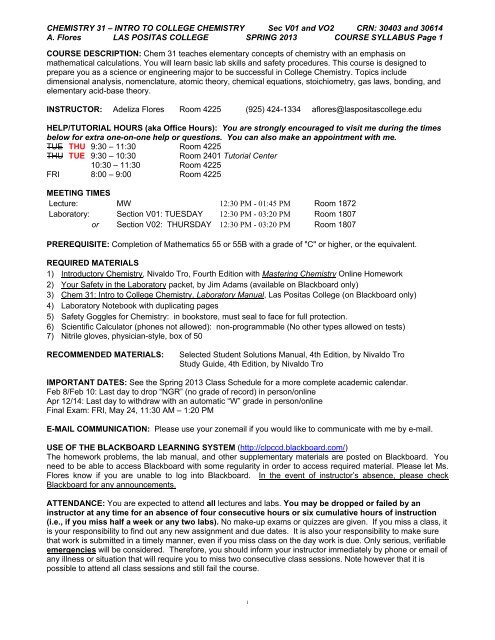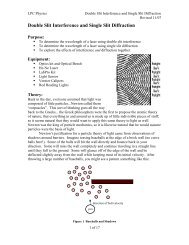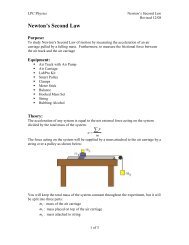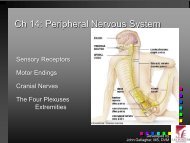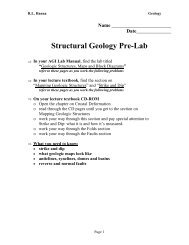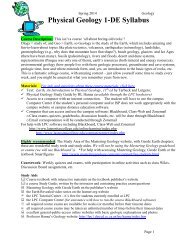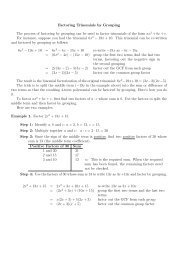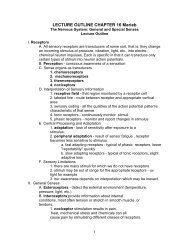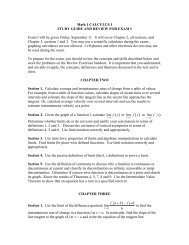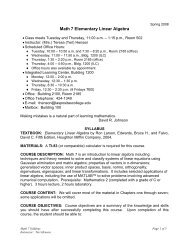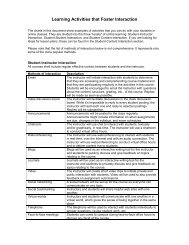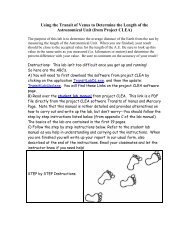Course Syllabus and Schedule - Las Positas College
Course Syllabus and Schedule - Las Positas College
Course Syllabus and Schedule - Las Positas College
Create successful ePaper yourself
Turn your PDF publications into a flip-book with our unique Google optimized e-Paper software.
CHEMISTRY 31 – INTRO TO COLLEGE CHEMISTRY Sec V01 <strong>and</strong> VO2 CRN: 30403 <strong>and</strong> 30614<br />
A. Flores LAS POSITAS COLLEGE SPRING 2013 COURSE SYLLABUS Page 1<br />
COURSE DESCRIPTION: Chem 31 teaches elementary concepts of chemistry with an emphasis on<br />
mathematical calculations. You will learn basic lab skills <strong>and</strong> safety procedures. This course is designed to<br />
prepare you as a science or engineering major to be successful in <strong>College</strong> Chemistry. Topics include<br />
dimensional analysis, nomenclature, atomic theory, chemical equations, stoichiometry, gas laws, bonding, <strong>and</strong><br />
elementary acid-base theory.<br />
INSTRUCTOR: Adeliza Flores Room 4225 (925) 424-1334 aflores@laspositascollege.edu<br />
HELP/TUTORIAL HOURS (aka Office Hours): You are strongly encouraged to visit me during the times<br />
below for extra one-on-one help or questions. You can also make an appointment with me.<br />
TUE THU 9:30 – 11:30 Room 4225<br />
THU TUE 9:30 – 10:30<br />
Room 2401 Tutorial Center<br />
10:30 – 11:30 Room 4225<br />
FRI 8:00 – 9:00 Room 4225<br />
MEETING TIMES<br />
Lecture: MW 12:30 PM - 01:45 PM Room 1872<br />
Laboratory: Section V01: TUESDAY 12:30 PM - 03:20 PM Room 1807<br />
or Section V02: THURSDAY 12:30 PM - 03:20 PM Room 1807<br />
PREREQUISITE: Completion of Mathematics 55 or 55B with a grade of "C" or higher, or the equivalent.<br />
REQUIRED MATERIALS<br />
1) Introductory Chemistry, Nivaldo Tro, Fourth Edition with Mastering Chemistry Online Homework<br />
2) Your Safety in the Laboratory packet, by Jim Adams (available on Blackboard only)<br />
3) Chem 31: Intro to <strong>College</strong> Chemistry, Laboratory Manual, <strong>Las</strong> <strong>Positas</strong> <strong>College</strong> (on Blackboard only)<br />
4) Laboratory Notebook with duplicating pages<br />
5) Safety Goggles for Chemistry: in bookstore, must seal to face for full protection.<br />
6) Scientific Calculator (phones not allowed): non-programmable (No other types allowed on tests)<br />
7) Nitrile gloves, physician-style, box of 50<br />
RECOMMENDED MATERIALS:<br />
Selected Student Solutions Manual, 4th Edition, by Nivaldo Tro<br />
Study Guide, 4th Edition, by Nivaldo Tro<br />
IMPORTANT DATES: See the Spring 2013 Class <strong>Schedule</strong> for a more complete academic calendar.<br />
Feb 8/Feb 10: <strong>Las</strong>t day to drop “NGR” (no grade of record) in person/online<br />
Apr 12/14: <strong>Las</strong>t day to withdraw with an automatic “W” grade in person/online<br />
Final Exam: FRI, May 24, 11:30 AM – 1:20 PM<br />
E-MAIL COMMUNICATION: Please use your zonemail if you would like to communicate with me by e-mail.<br />
USE OF THE BLACKBOARD LEARNING SYSTEM (http://clpccd.blackboard.com/)<br />
The homework problems, the lab manual, <strong>and</strong> other supplementary materials are posted on Blackboard. You<br />
need to be able to access Blackboard with some regularity in order to access required material. Please let Ms.<br />
Flores know if you are unable to log into Blackboard. In the event of instructor’s absence, please check<br />
Blackboard for any announcements.<br />
ATTENDANCE: You are expected to attend all lectures <strong>and</strong> labs. You may be dropped or failed by an<br />
instructor at any time for an absence of four consecutive hours or six cumulative hours of instruction<br />
(i.e., if you miss half a week or any two labs). No make-up exams or quizzes are given. If you miss a class, it<br />
is your responsibility to find out any new assignment <strong>and</strong> due dates. It is also your responsibility to make sure<br />
that work is submitted in a timely manner, even if you miss class on the day work is due. Only serious, verifiable<br />
emergencies will be considered. Therefore, you should inform your instructor immediately by phone or email of<br />
any illness or situation that will require you to miss two consecutive class sessions. Note however that it is<br />
possible to attend all class sessions <strong>and</strong> still fail the course.<br />
1
CHEMISTRY 31 – INTRO TO COLLEGE CHEMISTRY Sec V01 <strong>and</strong> VO2 CRN: 30403 <strong>and</strong> 30614<br />
A. Flores LAS POSITAS COLLEGE SPRING 2013 COURSE SYLLABUS Page 2<br />
Note on Recording of Lectures: Lectures require your presence <strong>and</strong> active participation. They may not be<br />
recorded in video form. If it is helpful for you to record the lecture in audio form for your own personal use,<br />
please ask me first. No recording of any kind may be distributed or posted online without the instructor’s<br />
permission.<br />
LEARNING ACCOMODATIONS: Any student who has a learning disability that affects their learning should<br />
speak to the instructor to discuss accommodations.<br />
GRADING - Letter Grades <strong>and</strong> Grading factors<br />
A 90% or higher B 80 - 89% C 67 - 79% D 55 - 66% F less than 55%<br />
5% Homework 15% Quizzes 25% Laboratory 35% Tests 20% Final Exam<br />
Your overall grade is a weighted average of your grade in the various categories; your percentage score is what counts. It<br />
is my policy to discuss grades only in person <strong>and</strong> not by e-mail.<br />
Reading <strong>and</strong> Quizzes: The chapters from the text that will be covered in the course are listed in the schedule.<br />
Homework includes reading the assigned chapters <strong>and</strong> taking notes before coming to class. The lectures may not cover<br />
everything presented in the book <strong>and</strong> will mostly focus on topics that are most challenging. You will, however, be<br />
responsible for all of the material in the reading as well as lecture material. Quizzes, announced or unannounced, will<br />
be given periodically during class <strong>and</strong> assume you have done the reading for the day. The lowest quiz score (or a<br />
missed quiz) will be dropped.<br />
Homework: You may think that you underst<strong>and</strong> a concept, but you do not underst<strong>and</strong> it sufficiently until you can explain it<br />
verbally <strong>and</strong> in writing. We will be using Mastering Chemistry Online homework. Homework gives you a chance to test<br />
your underst<strong>and</strong>ing of chemistry concepts in a variety of situations <strong>and</strong> problems. No late homework will be accepted,<br />
period. Additional problems may be assigned periodically. Each homework problem set will be collected at the beginning<br />
of class on the day that it is due. The due dates will be announced in class. The lowest homework score will not be<br />
counted. Any homework that is not turned in on time because you were late for class or you did not attend class will count<br />
as a zero.<br />
Note on Mastering Chemistry: To accommodate any technical problems encountered using Mastering Chemistry<br />
online, your percentage score for Mastering Chemistry may be adjusted when calculating your final homework grade.<br />
Laboratory: The laboratory is an important part of the course – it is worth 25% of your grade! See the section at the end<br />
about the laboratory component for more detailed information about the laboratory part of the course. Students who do<br />
not satisfactorily pass the laboratory portion may receive a failing grade for the course.<br />
Midterm Exams: There will be 4 one-hour tests. See the tentative class schedule. The tests will include problems, short<br />
answer questions, multiple-choice <strong>and</strong> short explanations. There will be no make-up tests. Missed tests will receive a<br />
grade of zero. The lowest test score (or a missed exam) will be dropped when final grades are prepared. Questions about<br />
laboratory experiments may be included on tests.<br />
Final Exam: The final exam will be comprehensive; that is, it will cover the entire course. The final exam will neither be<br />
given early, nor will it be given late.<br />
GRADE NOTIFICATION: Quizzes, tests, <strong>and</strong> lab reports will be returned with grade indicated. Quizzes <strong>and</strong> tests will be<br />
returned promptly. Lab reports will frequently be delayed. Any corrections regarding the grading of quizzes, exams, lab<br />
reports, or homework have to be brought to the instructor’s attention no later than the next meeting day (lab or lecture)<br />
after the grade was received. Final exams are not returned, but they are retained by the instructor for one year during<br />
which they are available for your review. All other work not picked up will be recycled at the end of the semester.<br />
DEADLINES: Please check the LPC website or the Class <strong>Schedule</strong> for important add/drop <strong>and</strong> withdrawal deadlines <strong>and</strong><br />
the final exam schedule.<br />
STUDENT LEARNING OUTCOMES: Student Learning Outcomes (SLOs) are the results or evidence of student learning.<br />
They demonstrate the extent to which student performance meets expectations of learning. Students will be assessed<br />
2
CHEMISTRY 31 – INTRO TO COLLEGE CHEMISTRY Sec V01 <strong>and</strong> VO2 CRN: 30403 <strong>and</strong> 30614<br />
A. Flores LAS POSITAS COLLEGE SPRING 2013 COURSE SYLLABUS Page 3<br />
during the semester to determine how well these outcomes are achieved. To see the course SLO, please go to<br />
http://www.laspositascollege.edu/slo/lists/slo_list.pdf. I will notify you if there any changes to the course SLO.<br />
ACADEMIC HONESTY: Honesty <strong>and</strong> integrity are highly cherished <strong>and</strong> very necessary attributes in scientific endeavors<br />
<strong>and</strong> in life. You are expected to do your own work <strong>and</strong> report your data honestly. Plagiarism (copying another person’s<br />
work) or falsifying data or dishonest work will be dealt with harshly. Punitive response may include assigning a failing<br />
grade for the work or for the entire course or expulsion from the college. A note can also be made on your permanent<br />
academic transcript.<br />
During an exam or a quiz the only things you are allowed to have on your desk are a non-programmable scientific<br />
calculator <strong>and</strong> a pencil or pen. All other items are forbidden, including but not limited to:<br />
1.) Cell phones <strong>and</strong> other electronic devices - If a cell phone is seen or heard during an exam or quiz without specific<br />
permission, you will be asked to leave <strong>and</strong> will receive a zero on the quiz or exam.<br />
2.) Dictionaries, textbooks, notes or references of any kind.<br />
PERSONAL RESPONSIBILITY: Chemistry 31 is a college-level course. It transfers to a number of universities for full<br />
college credit. I expect you to treat everyone in the class with respect, both me <strong>and</strong> other students. This means<br />
► cell phones <strong>and</strong> other personal electronic devices for non-school related use are put away <strong>and</strong> turned off<br />
► arriving on time for class (allow enough time for traffic jams <strong>and</strong> to find parking)<br />
► remembering to bring pens, goggles, calculators, etc with you<br />
► not leaving class unless you have a personal emergency<br />
► not disturbing others during class<br />
► not bringing children or visitors to class.<br />
► behaving with safety in mind during lab.<br />
ADVICE FOR SUCCESS IN THE COURSE: Ms. Flores’ primary goal is to guide <strong>and</strong> help you in learning the material for<br />
this course. I will help in any way that I can, though I cannot learn for you. If you are willing to work hard, <strong>and</strong> to seek help<br />
when you don’t underst<strong>and</strong> ideas or when the lecture goes too fast, then you will succeed. Please use my office hour or e-<br />
mail to communicate.<br />
I cannot overemphasize the importance of reading the assigned chapters, taking notes, <strong>and</strong> doing the homework<br />
problems, preferably before we even start lecture on it. Keep up with the schedule for the class. The best way to become<br />
proficient in doing the problems (with real underst<strong>and</strong>ing <strong>and</strong> not just following an example) is by doing many different<br />
kinds of problems. Spend time to think about how to answer each question. Review examples from the text or lecture<br />
notes. Underst<strong>and</strong>ing <strong>and</strong> reasoning are more important than memorizing facts or figures. BE PATIENT – it takes time to<br />
work out problems. When you have difficulty underst<strong>and</strong>ing a concept, get help: ask your instructor, the tutors, or<br />
classmates to explain ideas. Often students find it helpful to set-up study groups.<br />
CHEMISTRY 31 LABORATORY INFORMATION – A. Flores<br />
Chemistry is a lab science. The laboratory is an important learning tool where you will experience chemistry first h<strong>and</strong>.<br />
Sometimes, even if you follow all directions diligently, experiments don’t go as expected. This is not uncommon. Use<br />
these occasions to wonder <strong>and</strong> analyze why things happened as they did. Some of the greatest discoveries were made<br />
this way. In addition, some lectures may be done during lab times.<br />
ATTENDANCE: Attendance is m<strong>and</strong>atory <strong>and</strong> no make-up labs are given. Please do not be tardy because if you arrive<br />
late <strong>and</strong> do not hear my presentation on the safety issues <strong>and</strong> use of equipment, you may not be permitted to do the<br />
experiment. Points may be taken off due to tardiness. You cannot pass the course if you miss more than two labs. In the<br />
event of illness or emergency, you should notify the instructor as soon as possible at the phone number or e-mail address<br />
listed in the course syllabus.<br />
Students who have specific health conditions (e.g., pregnancy, allergies, skin sensitivities, etc.) should consult<br />
their physicians for recommendations on working with chemicals in the laboratory.<br />
SAFETY FIRST: The responsibility for lab safety rests with every student in the laboratory. You must use<br />
common sense <strong>and</strong> work carefully to avoid chemical spills, broken glassware, <strong>and</strong> fires. This ensures not only<br />
your own safety, but that of your lab mates. Know the hazards of each chemical so that you will know what level<br />
3
CHEMISTRY 31 – INTRO TO COLLEGE CHEMISTRY Sec V01 <strong>and</strong> VO2 CRN: 30403 <strong>and</strong> 30614<br />
A. Flores LAS POSITAS COLLEGE SPRING 2013 COURSE SYLLABUS Page 4<br />
of caution to use when h<strong>and</strong>ling it. Lab grades may be penalized for careless or unsafe activities. You will not be<br />
permitted to work in the laboratory at all unless you are wearing appropriate shoes (close-toed <strong>and</strong> close-heeled)<br />
<strong>and</strong> clothing <strong>and</strong> approved safety goggles. Absolutely no food or drink in the laboratory.<br />
LOCKERS: Each student will be assigned a locker containing lab equipment <strong>and</strong> supplies necessary for the experiments.<br />
Students will be responsible for the locker contents <strong>and</strong> the key.<br />
LAB PREPARATION: Before coming to lab,<br />
1) Read each lab carefully <strong>and</strong> complete the assigned pre-lab form (found in the lab manual, usually at the end of the<br />
assigned experiment).<br />
2) The objectives, procedure, <strong>and</strong> data tables should be written in your lab notebook. I will collect duplicates from your<br />
notebook promptly at the start of the lab session. For safety reasons, I will not allow you to do the lab if you do<br />
not turn in a pre-written procedure in your notebook before the pre-lab discussion.<br />
GRADING (25% OF OVERALL GRADE): Your grade will be based on (1) your performance <strong>and</strong> conduct in lab including<br />
compliance with safety rules, (2) the cleanliness of your work area, the sinks, the balance room, <strong>and</strong> the surrounding<br />
counters, (3) your written lab reports (you will turn in the original from your lab notebook), <strong>and</strong> (4) lab quizzes (opennotebook)/practicals.<br />
Students who do not satisfactorily pass the laboratory portion may receive a failing grade for the<br />
course. The grading on each lab report will be based upon<br />
1. Description of experimental procedures<br />
2. Completeness of data collected<br />
3. Quality of data collected<br />
4. Computational precision <strong>and</strong> accuracy<br />
5. Accuracy <strong>and</strong> precision of experimental laboratory results<br />
6. Proper use of symbolic notation<br />
7. Quality of analysis of scientific principles explored<br />
8. Quality of narrative explanations <strong>and</strong> reasoning<br />
9. Representation of data in tables or diagrams<br />
More details are provided in the h<strong>and</strong>out “GUIDE TO LABORATORY PERFORMANCE AND WRITING REPORTS”.<br />
DUE DATES: Laboratory reports are usually due at the beginning of the lab a week after completion of the experiment.<br />
Late lab write-ups may be turned in but scores will be reduced by 10% if the report is turned in later that day <strong>and</strong> 25% per<br />
day thereafter. Lab reports received later than 4 days will not be graded. You will not receive any points for a laboratory<br />
if you do not turn in a lab report even if you did the experiment. You may be asked to turn in a formal, journal-style (wordprocessed)<br />
report.<br />
PERFORMANCE IN THE LABORATORY: Some rules which may affect your grade for the lab include the following.<br />
1) In order for you to be successful <strong>and</strong> safe in the laboratory, pre-lab write-ups in your notebook are required. Please<br />
remember that if you do not have the procedure pre-written in your lab notebook before you come in to lab, you will<br />
not be allowed to do the lab <strong>and</strong> will lose points for that lab.<br />
2) For most of the labs, each student will independently carry out the procedure to completion <strong>and</strong> collect his or her own<br />
data. A student may not work with a partner without the instructor’s permission.<br />
3) Experiments <strong>and</strong> lab discussions require your full attention. Please do not bring any work or use any personal devices<br />
that will distract you from safely performing the lab <strong>and</strong> paying attention to the discussion of important lab issues.<br />
4) Safety in the laboratory is of primary importance. At the minimum, lab grades may be penalized for careless or unsafe<br />
activities. You may be asked to leave the lab (<strong>and</strong> lose points) if you do not comply with safety instructions. You will<br />
not be permitted to enter the laboratory at all unless you are wearing appropriate shoes (close-toed <strong>and</strong> close-heeled)<br />
<strong>and</strong> clothing. You will not be allowed to do the experiment if you do not have your own goggles.<br />
5) Each student is responsible for washing their work area with water <strong>and</strong> detergent before <strong>and</strong> after doing a lab.<br />
6) The whole class is responsible for keeping the floor, sinks, counters, <strong>and</strong> balance room clean. Everyone will be<br />
penalized if these community areas are left dirty <strong>and</strong> disorganized (chemical spills, equipment <strong>and</strong> glassware not<br />
properly replaced, floor spills, sink clogs, trash, etc.)<br />
7) For most cases, you will need to collect all the data <strong>and</strong> do all the necessary calculations for the experiment before<br />
leaving the lab. It is your responsibility to make sure that I initial your data <strong>and</strong> calculations before leaving the lab.<br />
8) The use of cellphones, smartphones, <strong>and</strong> other personal electronic devices for non-school related purposes is not<br />
allowed in the laboratory. If an emergency arises that requires you to use your phone, please step outside of the lab<br />
to do so.<br />
4
CHEMISTRY 31 – INTRO TO COLLEGE CHEMISTRY Sec V01 <strong>and</strong> VO2 CRN: 30403 <strong>and</strong> 30614<br />
A. Flores LAS POSITAS COLLEGE SPRING 2013 COURSE SYLLABUS Page 5<br />
Chem 31 Spring 2013 Tentative Lecture <strong>and</strong> Laboratory <strong>Schedule</strong><br />
The schedule below will give you an idea of the topics that we will cover <strong>and</strong> the pace of the class. Please note that this<br />
schedule is tentative <strong>and</strong> the class may not necessarily follow it exactly as it appears below.<br />
WK DATE MON WED TUE/THU (LAB)<br />
1<br />
Jan 21-<br />
Intro<br />
Introduction to the Lab<br />
NO CLASS<br />
25<br />
Chapter 1<br />
“Your Safety in the Lab” (blackboard)<br />
2<br />
Jan 28 – Ch 2: Measurements/<br />
3101 Measurement Skills,<br />
Ch 2: Measurements/ Prob. Solving<br />
Feb 1 Prob. Solving<br />
Locker Check-in<br />
3 Feb 4 – 8 Ch 2: Cont. Prob. Solving Ch 3: Matter <strong>and</strong> Energy<br />
Measurement/Units Worksheets<br />
Graphing Exercise<br />
Review of lab notebook writing*<br />
4<br />
Feb 11 -<br />
3102 Physical <strong>and</strong> Chemical<br />
Ch 3: Matter <strong>and</strong> Energy Ch 4: Atoms <strong>and</strong> Elements<br />
15<br />
Properties (Chemical Sleuth)<br />
5<br />
Feb 18 -<br />
22<br />
NO CLASS Exam 1 3103 Separation of a Mixture<br />
6<br />
Feb 25 –<br />
Ch 4: Atoms <strong>and</strong> Elements Ch 5: Molecules <strong>and</strong> Compounds<br />
Mar 1<br />
3107 Nomenclature Worksheets*<br />
7<br />
Mar 4 – Ch 5: Molecules <strong>and</strong><br />
3104 Elements, Compounds <strong>and</strong><br />
Ch 6: Chemical Composition<br />
Mar 8 Compounds<br />
the Mole*<br />
8<br />
Mar 11 - Ch 6: Chemical<br />
3105 Empirical Formula of a<br />
Ch 7: Chemical Reactions<br />
15 Composition<br />
Compound<br />
9<br />
Mar 18 -<br />
22<br />
Ch 7: Chemical Reactions Exam 2 3115 Net Ionic Equations*<br />
10<br />
Mar 25 - Ch. 8: Quantities in Ch. 8: Quantities in Chemical<br />
29 Chemical Reactions<br />
Reactions<br />
3108 Reaction Stoichiometry<br />
11<br />
Apr 1 –<br />
Apr 5<br />
SPRING BREAK<br />
12<br />
Apr 8 - Ch. 9: Electrons in Ch. 9: Electrons in Atoms/Periodic<br />
12 Atoms/Periodic Table<br />
Table<br />
3109 Limiting Reagents<br />
13<br />
Apr 15 -<br />
19<br />
Ch. 10: Chemical Bonding Exam 3 3110 Molecular Geometry*<br />
14<br />
Apr 22 -<br />
26<br />
Ch. 10: Chemical Bonding Ch. 11: Gases 3111 Experiment with Gases<br />
15<br />
Apr 29 –<br />
May 3<br />
Ch. 11: Gases Ch. 12: Liquids/Solids/Forces 3112 Solutions <strong>and</strong> Concentrations<br />
16<br />
May 6-<br />
Ch. 12:<br />
3113 Titration Techniques,<br />
Exam 4<br />
10 Liquids/Solids/Forces<br />
3114 An Acid-Base Titration<br />
17<br />
May 13 -<br />
17<br />
Ch. 13: Solutions Ch. 13: Solutions 3114 An Acid-Base Titration<br />
18<br />
May 20 -<br />
Review<br />
Ch. 14: Acids <strong>and</strong> Bases Ch. 14: Acids <strong>and</strong> Bases<br />
24<br />
Locker Check out<br />
18 May 24<br />
Final Exam: FRI, May 24<br />
11:30 AM – 1:20 PM<br />
* indicates that the activity will be done on worksheets <strong>and</strong> not in the lab notebook.<br />
5


